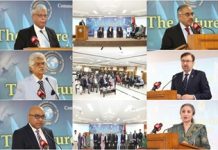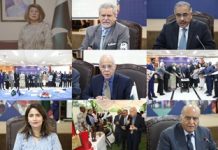The military rulers and their subordinate class of civilian bureaucracy share an elitist view of politics and think that only they understand what is good for the country; also, that they are intellectually better equipped than the elected representatives to pursue that good
It is often asserted that we have constantly failed in achieving consensus on fundamental political values. This is wrong. But let’s first define the fundamental political values that a nation must choose carefully and, having agreed on, consider sacrosanct.
They entail the nature of the political system and distribution of power among various parts of the government and between the federal and the provincial governments. They also presuppose the acceptance by major actors the elites, civil society and the political parties of the basic rules of the political game; in other words, the limits within which they would play politics.
Since its founding, Pakistan has had a consensus on parliamentary democracy, federalism, and the Islamic character of the state, the last to the extent that parliament would not make any law repugnant to the spirit of Islam. The 1956 and ’73 constitutions reflect a social contract that the representatives of the people reached after much debate, discussion and compromises. In drawing the two constitutions, which mirror each other and are grounded in similar political values, the legislative bodies had representation from all ethnic communities, regional groups, religious and mainstream parties, even though their numerical strength varied according to the popular support they were able to gather at that point.
We have demonstrated national consensus on the political values embedded in a federal-parliamentary form of government three times in our political history 1956, 1973, and in 1997. (On the last occasion, all political parties restored the original spirit of the ’73 Constitution by passing the 13th amendment that removed anti-parliamentary features that were inserted under the 8th amendment in 1985.)
Three military rulers, Ayub Khan, Zia ul-Haq and Pervez Musharraf subverted the national consensus because they had no legitimate role in politics under the Constitution and its basic political values. The Constitution and its principles posed a structural obstacle for these rules which they removed by capturing political power and seeking validation of their acts by the superior courts comprising judges that had retaken the oath of office under PCOs (provisional constitutional orders).
In Ayub Khan’s case, he decided to abrogate the ’56 Constitution altogether and frame his own Constitution in 1962. His Constitution was presidential in nature because he thought that Pakistan could prosper under a system that placed him (Ayub) at the centre of everything political.
One finds remarkable similarity in the political thinking of all the military rulers; all have sought to undermine the sovereignty of the parliament and exercise vice-regal authority to dissolve governments. They have also doubted the sincerity and competence of people’s representatives.
The military rulers and their subordinate class of civilian bureaucracy share an elitist view of politics and think that only they understand what is good for the country; also, that they are intellectually better equipped than the elected representatives to pursue that good. Interestingly, all military rulers have co-opted pliable politicians, but kept them subservient, to create a political façade of legislative institutions.
The military rulers using a variety of political means at their disposal have attempted to undermine the national consensus by substituting the social contract by a concept of a military-guided democracy, a euphemism for manipulating the institutions of the state to keep the military in power and degrade the legislatures and legislative and political processes.
Twice in our history, when the political parties were able to regain real authority, they reverted to the original national consensus in 1973 and 1997. True democracy constitutes genuine representation of the people and reflects the fundamental political values. On the contrary, guided democracy reflects only power interests and personal ambitions of a ruler who assumes a messianic character and plays the role of a great visionary. At the end of every episode of guided democracy, the third being in progress, Pakistan has developed fissures because the growth of democratic values and culture has been stunted. By stifling authentically mainstream parties military regimes have contributed to the political influence of religious and parochial groups and their extremist politics.
Pakistan is again at the crossroads and has to determine its political destiny in the coming months. A national consensus is emerging on the restoration of our true political values and the social contract on parliamentary democracy and federalism. This also defines the current political struggle, which is essentially between forces that want to restore democracy and constitutionalism and those that want to retain the status quo.
I am inclined to present this struggle of the opposites in dialectical terms even at the risk of simplicity because of the general criticism against the political elites and for the mess they created when they were in power. I am also cognisant of the fact that many of the top leaders of the mainstream political parties do not inspire confidence in thinking Pakistanis. Nor is their feudal social background and authoritarian mindset helpful in convincing many doubtful Pakistanis of their capacity to offer a better menu than what is on the table now.
However, democracy and constitutionalism offer institutional mechanisms to correct mistakes; they also hold public officials accountable for their misdeeds. As we travel further down the democratic path, political life begins to improve. Bad leaders get discredited and lose public support. They can be, and are, thrown out of power. In fact, political leaders of the past get revived during military dictatorships because people forget their mistakes and begin to focus on the wrongs of the military rulers and their associates. Uninterrupted democracy would have weeded such elements out, making the emergence of new leaders possible through a genuine political process.
Pakistanis today predominantly think that the military has no role to play in politics and it must accept the civilian supremacy i.e., the sovereignty of the parliament. It is sad that the military, one of our finest national institutions, has lost much of its standing and true value in the society because of the personal ambitions of its top brass. The present political polarisation is very dangerous because it puts the military in direct opposition to the democratic forces, a term that I use very loosely for those who want Pakistan to return to the national consensus.
The 1973 Constitution, whatever its deformities and form at the present, offers a great opportunity to actors across the political divide to settle the ongoing struggle. Only the revival of the original and true national consensus can guarantee us a safe and secure exit from the current political crisis.
The author is a professor of Political Science at the Lahore University of Management Sciences.












